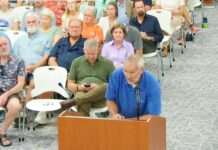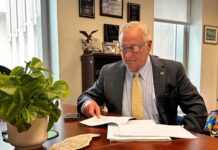
As Florida legislators prepare for a 2024 opening of session, Keys officials joined state Rep. Jim Mooney and state Sen. Ana Maria Rodriguez to relay policy priorities and funding requests during a Nov. 2 virtual meeting.
Stakeholders from municipalities across Monroe County, as well as executives from various nonprofit agencies, were among the attendees of the annual Keys delegation meeting that’s held before the start of session in Tallahassee. Many governmental agencies asked Mooney and Rodriguez to assist in again securing $20 million for the Florida Keys Stewardship Act. Passed by the state Legislature and signed into law in 2016, the act has historically meant millions of dollars for water quality projects like canal restoration.
In recent years, state officials have fully funded the Stewardship Act and another $5 million on top for land acquisition. Lisa Tennyson, county legislative affairs director, told Mooney and Rodriguez that the $20 million appropriation is the county’s No. 1 priority heading into session.
Many Keys officials also listed a merger of Monroe County’s court system with Miami-Dade as a top issue to watch as the Judicial Consolidation Assessment Committee forms its recommendation to the state Supreme Court and legislature. All municipalities acknowledged their opposition to the idea in the form of a letter to the 14-person committee.
“The county commission has formally opposed any consolidation of our circuit court with Dade with the understanding that it’s not something that would help in terms of representation,” Tennyson said.
The judicial committee met the following day and will recommend that Florida’s judicial circuits remain unchanged with no consolidations.
Rising insurance costs across Monroe County, specifically hikes on policyholders with Citizens, remains a concern for many officials. Tennyson said the county would like to see a 10% cap on the yearly increases. In addition, Tennyson hopes the legislature will remove the unnecessary costs associated with a flood insurance requirement for elevated homes and properties with minimal flood hazard.
Increasing insurance costs aren’t only affecting homeowners. For residents living in Habitat for Humanity homes, the ability to afford insurance is becoming more difficult by the day. Mel Montagne, president of Fair Insurance Rates in Monroe (FIRM), said they’re working with Habitat officials and the Insurance Consumer Advocate office, which has the ability to put forth legislation, to find some kind of solution.
“Believe me, it’s a crisis,” Montagne said.
With the Keys in desperate straits for affordable housing, Monroe County Schools Superintendent Theresa Axford is asking for $20 million to advance the housing project at the school headquarters on Trumbo Road in Key West. Axford said the district saw 30 candidates for positions walk away due to the lack of affordable housing.
“The cost of living creates a revolving door in the classroom,” said Axford, adding that the district is still seeking an English teacher at Key West High School and an algebra teacher at Sugarloaf School. “The list goes on. … Most of that relates to affordable housing.”
Mooney and Rodriguez agreed to tackle legislation that would allow county Tourist Development council funds for affordable housing in the Keys. Between 2020 and 2022, the TDC raked in $25 million in surplus revenue that the county commission would like to use for workers in the hospitality and tourism business. Florida law allows TDC funds for public facilities, but affordable housing isn’t currently an allowable use.
The TDC, an advisory committee for the county commission, uses bed tax revenues to advertise the Keys, promote the largest events and for large building projects that boost tourism.






















